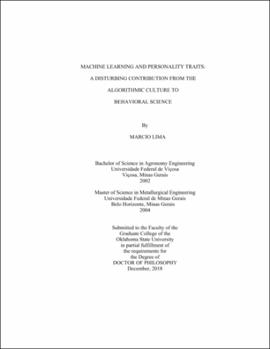| dc.contributor.advisor | Dursun, Delen | |
| dc.contributor.author | Lima, Marcio | |
| dc.date.accessioned | 2021-04-06T16:06:38Z | |
| dc.date.available | 2021-04-06T16:06:38Z | |
| dc.date.issued | 2018-12 | |
| dc.identifier.uri | https://hdl.handle.net/11244/329102 | |
| dc.description.abstract | The time has come for behavioral scholars to benefit from the superior prediction accuracy of modern data mining practices over traditional data modeling. The current investigative study uses machine learning techniques to explore the prediction power of the HEXACO traits on work performance. To obtain reliable results, I employ the most prevailing machine learning algorithms in addition to logistic and multiple regression. The concomitant use of multiple prediction models that are grounded solidly in specific literature is applied to reveal the most accurate model for prediction purposes. One relevant methodological contribution of the present study is the employment a Random Forest-based heuristic method that computes the ratio of actual splits on a certain variable to the number of times that particular variable was selected as a candidate to split within the forest. By computing the order of importance of traits as job performance predictors, the current research illuminates the field with relevant and accurate information regarding the crucial role of humility, the strongest job performance predictor. Also, from a novel perspective and in light of Liebig's Law of the Minimum, the present study reveals a strong influence of relative proportions of traits (i.e., ratio between scores of traits) on job performance ratings. Interestingly the second most important predictor was found to be the ratio between scores on emotional stability and conscientiousness, followed by the ratio between scores on extraversion and openness to experience. In certain conditions, these results reveal that proportions between two different traits may be stronger predictors of job performance than individual traits. Taken all together, this research is the first academic study to use machine learning techniques on HEXACO personality scores to reveal job performance-related predictors with seamless high predictive accuracy. Indeed, the methodological and theoretical contributions obtained in the current study should be carefully examined by practitioners and scientists in order to pragmatically leverage the management research field. | |
| dc.format | application/pdf | |
| dc.language | en_US | |
| dc.rights | Copyright is held by the author who has granted the Oklahoma State University Library the non-exclusive right to share this material in its institutional repository. Contact Digital Library Services at lib-dls@okstate.edu or 405-744-9161 for the permission policy on the use, reproduction or distribution of this material. | |
| dc.title | Machine learning and personality traits: A disturbing contribution from the algorithmic culture to behavioral science | |
| dc.contributor.committeeMember | Edwards, Bryan | |
| dc.contributor.committeeMember | Wallace, J. Craig | |
| dc.contributor.committeeMember | Joplin, Toby | |
| osu.filename | Lima_okstate_0664D_16078.pdf | |
| osu.accesstype | Open Access | |
| dc.type.genre | Dissertation | |
| dc.type.material | Text | |
| dc.subject.keywords | hexaco | |
| dc.subject.keywords | humility | |
| dc.subject.keywords | machine learning | |
| dc.subject.keywords | performance | |
| dc.subject.keywords | personality traits | |
| dc.subject.keywords | work performance | |
| thesis.degree.discipline | Business Administration | |
| thesis.degree.grantor | Oklahoma State University | |
